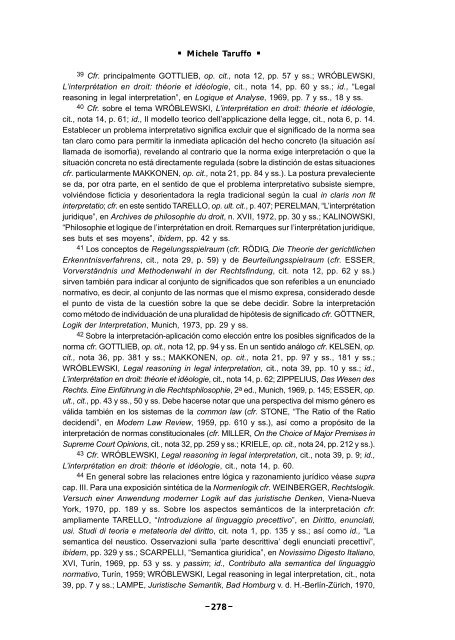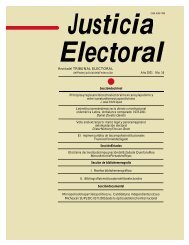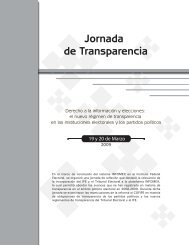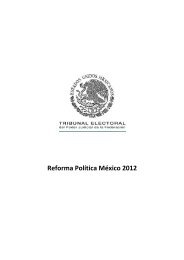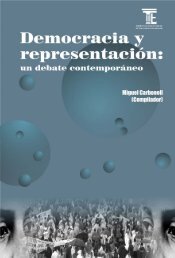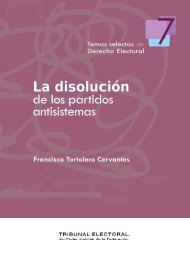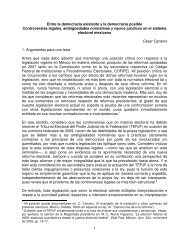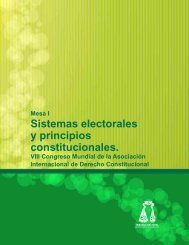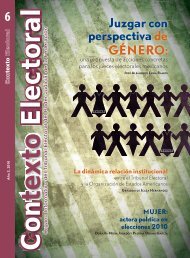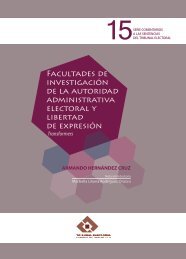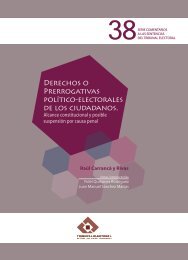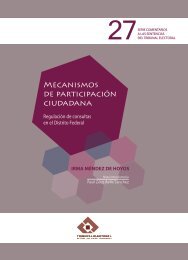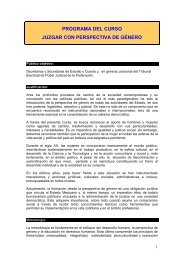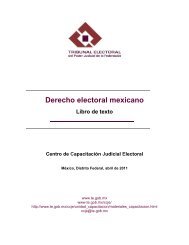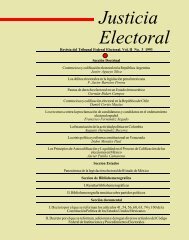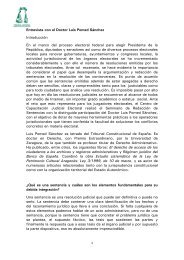La Motivación de la Sentencia Civil - Tribunal Electoral del Poder ...
La Motivación de la Sentencia Civil - Tribunal Electoral del Poder ...
La Motivación de la Sentencia Civil - Tribunal Electoral del Poder ...
Create successful ePaper yourself
Turn your PDF publications into a flip-book with our unique Google optimized e-Paper software.
Michele Taruffo<br />
39 Cfr. principalmente GOTTLIEB, op. cit., nota 12, pp. 57 y ss.; WRÓBLEWSKI,<br />
L’interprétation en droit: théorie et idéologie, cit., nota 14, pp. 60 y ss.; id., “Legal<br />
reasoning in legal interpretation”, en Logique et Analyse, 1969, pp. 7 y ss., 18 y ss.<br />
40 Cfr. sobre el tema WRÓBLEWSKI, L’interprétation en droit: théorie et idéologie,<br />
cit., nota 14, p. 61; id., Il mo<strong>de</strong>llo teorico <strong>de</strong>ll’applicazione <strong>de</strong>l<strong>la</strong> legge, cit., nota 6, p. 14.<br />
Establecer un problema interpretativo significa excluir que el significado <strong>de</strong> <strong>la</strong> norma sea<br />
tan c<strong>la</strong>ro como para permitir <strong>la</strong> inmediata aplicación <strong>de</strong>l hecho concreto (<strong>la</strong> situación así<br />
l<strong>la</strong>mada <strong>de</strong> isomorfia), reve<strong>la</strong>ndo al contrario que <strong>la</strong> norma exige interpretación o que <strong>la</strong><br />
situación concreta no está directamente regu<strong>la</strong>da (sobre <strong>la</strong> distinción <strong>de</strong> estas situaciones<br />
cfr. particu<strong>la</strong>rmente MAKKONEN, op. cit., nota 21, pp. 84 y ss.). <strong>La</strong> postura prevaleciente<br />
se da, por otra parte, en el sentido <strong>de</strong> que el problema interpretativo subsiste siempre,<br />
volviéndose ficticia y <strong>de</strong>sorientadora <strong>la</strong> reg<strong>la</strong> tradicional según <strong>la</strong> cual in c<strong>la</strong>ris non fit<br />
interpretatio; cfr. en este sentido TARELLO, op. ult. cit., p. 407; PERELMAN, “L’interprétation<br />
juridique”, en Archives <strong>de</strong> philosophie du droit, n. XVII, 1972, pp. 30 y ss.; KALINOWSKI,<br />
“Philosophie et logique <strong>de</strong> l’interprétation en droit. Remarques sur I’interprétation juridique,<br />
ses buts et ses moyens”, ibi<strong>de</strong>m, pp. 42 y ss.<br />
41 Los conceptos <strong>de</strong> Regelungsspielraum (cfr. RÖDIG, Die Theorie <strong>de</strong>r gerichtlichen<br />
Erkenntnisverfahrens, cit., nota 29, p. 59) y <strong>de</strong> Beurteilungsspielraum (cfr. ESSER,<br />
Vorverständnis und Metho<strong>de</strong>nwahl in <strong>de</strong>r Rechtsfindung, cit. nota 12, pp. 62 y ss.)<br />
sirven también para indicar al conjunto <strong>de</strong> significados que son referibles a un enunciado<br />
normativo, es <strong>de</strong>cir, al conjunto <strong>de</strong> <strong>la</strong>s normas que el mismo expresa, consi<strong>de</strong>rado <strong>de</strong>s<strong>de</strong><br />
el punto <strong>de</strong> vista <strong>de</strong> <strong>la</strong> cuestión sobre <strong>la</strong> que se <strong>de</strong>be <strong>de</strong>cidir. Sobre <strong>la</strong> interpretación<br />
como método <strong>de</strong> individuación <strong>de</strong> una pluralidad <strong>de</strong> hipótesis <strong>de</strong> significado cfr. GÖTTNER,<br />
Logik <strong>de</strong>r Interpretation, Munich, 1973, pp. 29 y ss.<br />
42 Sobre <strong>la</strong> interpretación-aplicación como elección entre los posibles significados <strong>de</strong> <strong>la</strong><br />
norma cfr. GOTTLIEB, op. cit., nota 12, pp. 94 y ss. En un sentido análogo cfr. KELSEN, op.<br />
cit., nota 36, pp. 381 y ss.; MAKKONEN, op. cit., nota 21, pp. 97 y ss., 181 y ss.;<br />
WRÓBLEWSKI, Legal reasoning in legal interpretation, cit., nota 39, pp. 10 y ss.; id.,<br />
L’interprétation en droit: théorie et idéologie, cit., nota 14, p. 62; ZIPPELIUS, Das Wesen <strong>de</strong>s<br />
Rechts. Eine Einführung in die Rechtsphilosophie, 2 a ed., Munich, 1969, p. 145; ESSER, op.<br />
ult., cit., pp. 43 y ss., 50 y ss. Debe hacerse notar que una perspectiva <strong>de</strong>l mismo género es<br />
válida también en los sistemas <strong>de</strong> <strong>la</strong> common <strong>la</strong>w (cfr. STONE, “The Ratio of the Ratio<br />
<strong>de</strong>ci<strong>de</strong>ndi”, en Mo<strong>de</strong>rn <strong>La</strong>w Review, 1959, pp. 610 y ss.), así como a propósito <strong>de</strong> <strong>la</strong><br />
interpretación <strong>de</strong> normas constitucionales (cfr. MILLER, On the Choice of Major Premises in<br />
Supreme Court Opinions, cit., nota 32, pp. 259 y ss.; KRIELE, op. cit., nota 24, pp. 212 y ss.).<br />
43 Cfr. WRÓBLEWSKI, Legal reasoning in legal interpretation, cit., nota 39, p. 9; id.,<br />
L’interprétation en droit: théorie et idéologie, cit., nota 14, p. 60.<br />
44 En general sobre <strong>la</strong>s re<strong>la</strong>ciones entre lógica y razonamiento jurídico véase supra<br />
cap. III. Para una exposición sintética <strong>de</strong> <strong>la</strong> Normenlogik cfr. WEINBERGER, Rechtslogik.<br />
Versuch einer Anwendung mo<strong>de</strong>rner Logik auf das juristische Denken, Viena-Nueva<br />
York, 1970, pp. 189 y ss. Sobre los aspectos semánticos <strong>de</strong> <strong>la</strong> interpretación cfr.<br />
ampliamente TARELLO, “Introduzione al linguaggio precettivo”, en Diritto, enunciati,<br />
usi. Studi di teoria e metateoria <strong>de</strong>l diritto, cit. nota 1, pp. 135 y ss.; así como id., “<strong>La</strong><br />
semantica <strong>de</strong>l neustico. Osservazioni sul<strong>la</strong> ‘parte <strong>de</strong>scrittiva’ <strong>de</strong>gli enunciati precettivi”,<br />
ibi<strong>de</strong>m, pp. 329 y ss.; SCARPELLI, “Semantica giuridica”, en Novissimo Digesto Italiano,<br />
XVI, Turín, 1969, pp. 53 y ss. y passim; id., Contributo al<strong>la</strong> semantica <strong>de</strong>l linguaggio<br />
normativo, Turín, 1959; WRÓBLEWSKI, Legal reasoning in legal interpretation, cit., nota<br />
39, pp. 7 y ss.; LAMPE, Juristische Semantik, Bad Homburg v. d. H.-Berlín-Zürich, 1970,<br />
278


